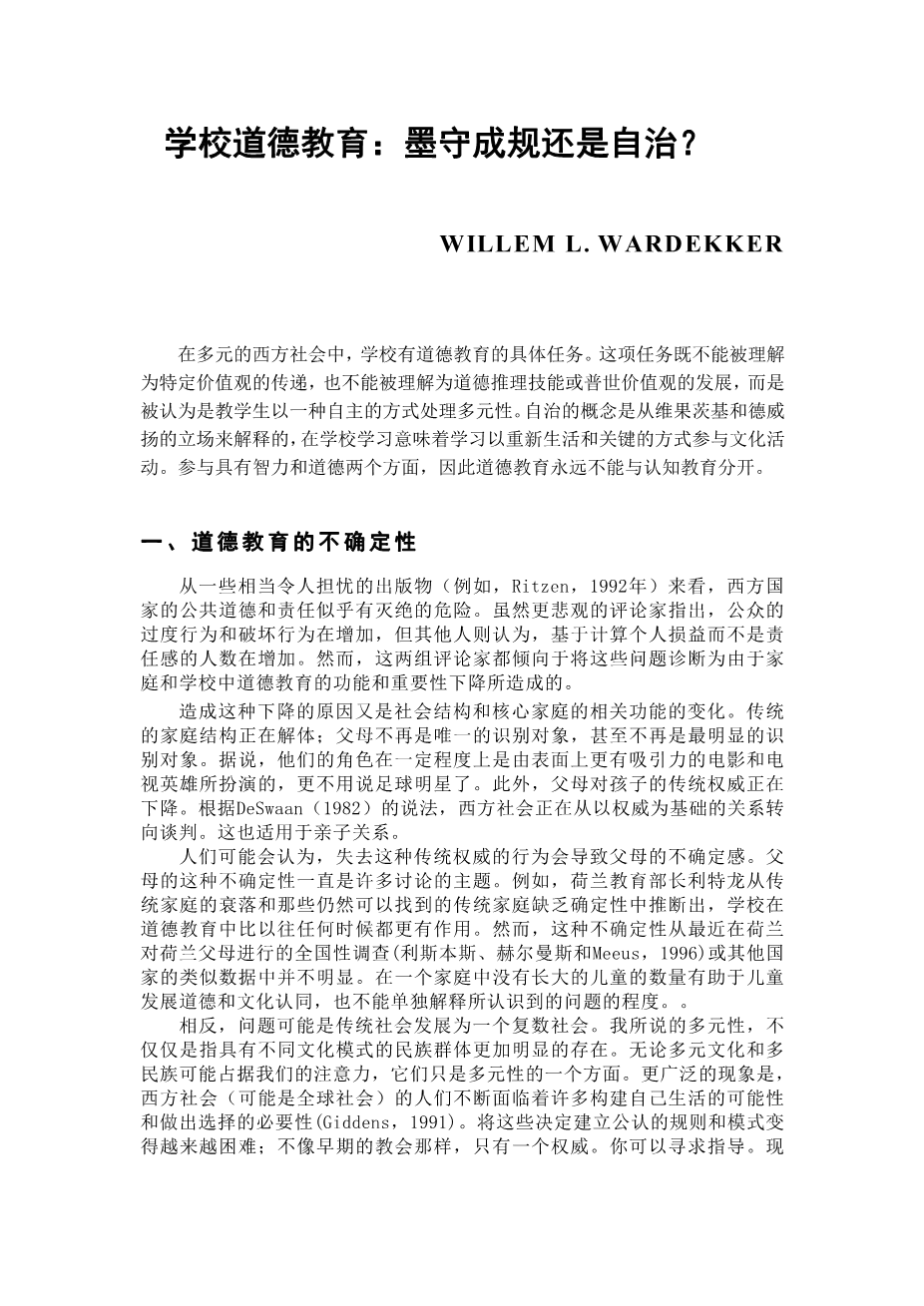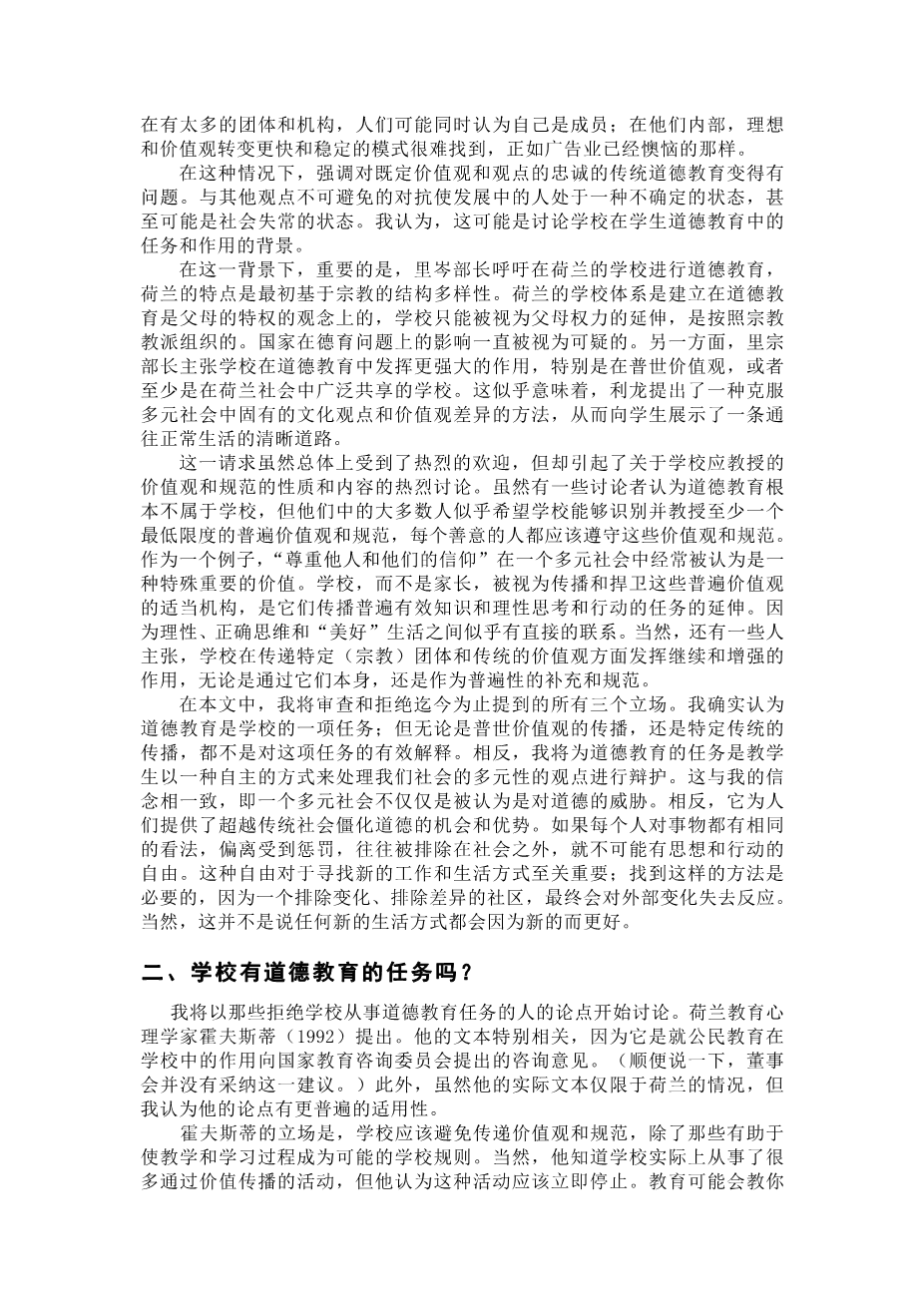Journal o/ Philosophy o/ Educalion. vol. 35. No. 1. 2001
Schools and Moral Education: Conformism or Autonomy?
wILLEM L. wARDEKKER
In pluralislic Weslern socielies. schools hafe a speci/ic lask in moral educalion. This lask is lo be underslood neilher as lhe lransmission o/ speci/ic falues. nor as lhe defelopmenl o/ moral reasoning skills or unifersal falues. bul as leaching pupils lo handle pluralily in an aulonomous way. The concepl o/ aulonomy is inlerpreled /rom a vygolskian and Deweyan posilion. where learning in school means learning lo parlicipale in cullural aclifilies in a re/leclife and crilical way. Parlicipalion has bolh inlelleclual and moral aspecls. and lhus moral educalion can nefer be separaled /rom cognilife educalion.
UNCERTAINTY IN M0RAL EDUCATI0N
To judge from some rather alarming publications (for example. Ritzen. l992). it seems that public morality and responsibility in western countries are in danger of becoming extinct.while the more pessimistic commentators point to an increase in public excesses and vandalism. others see an increase in the number of people who base their behaviour on calculation of personal gains and losses rather than on a feeling of responsibility.Both sets of commentators. however. tend to diagnose these problems as caused by a decline in the function and importance of moral education in the family and in schools.
The causes of this decline. in its turn. are found in changes in the structure of society and the associated functions of the nuclear family. Traditional family structures are dissolving: parents are no longer the only or even the most obvious objects of identification.Their role is said to have been taken. in part. by superficially much more attractive film and television heroes. not to mention football stars.Moreover. the traditional authority of parents over their children is declining. According to De swaan (l982). western societies are changing from authority.based relations to negotiation.based relations.This applies to parent-child relations too.
0ne would expect such loss of traditional authority to lead to feelings of uncertainty in parents.This supposed uncertainty of parents has been
o The Journal o/ lhe Philosophy o/ Educalion sociely o/ Greal Brilain 2001. Published by Blackwell Publishers. l08 Cowley Road. 0xford 0x4 lJF and 350 Main street. Malden. MA 02l48. UsA.
l02 W. L. Wardekker
the subject of many discussions.Ritzen. the Dutch Minister of Education. for instance. inferred from the decline of the traditional family and the lack of certainty in those traditional families that can still be found. that more than ever schools have a role in moral education. However. such uncertainty is not evident from a recent nationwide survey among Dutch parents in The Netherlands (Rispens. Hermanns and Meeus. l996). or from similar data from other countries.Neither is it plausible that the number of children that are not raised within a family that contributes to the childrens developing moral and cultural identity could alone account for the extent of the perceived problem.
Rather. the problem may be the development of traditional society into a plural society.By plurality. I mean not only the ever more manifest presence of ethnic groups with different cultural patterns. However much multiculturality and multi.ethnicity may occupy our attention. they are only one aspect of plurality.The wider phenomenon is that people in western societies (and probably globally) are confronted continuously with numerous possibilities for structuring their lives and with the necessity of making choices (Giddens. l99l).It is becoming more difficult to ground these decisions in accepted rules and patterns: there is not just one authority. like the Church in earlier times. to which one can look for guidance.There is now a plethora of groups and institutions of which people may consider themselves members. often at the same time: and within them. ideals and values shift quicker and stable patterns are difficult to find. as the advertising business has found out to its chagrin.
In this situation. a traditional moral education. which emphasises loyalty to established values and points of view. becomes problematic. The unavoidable confrontation with other points of view leaves develop. ing persons in a state of uncertainty and even possibly of anomie.This. I think. may be the background to discussions about the task and role of the schools in the moral education of their pupils.
It is significant in this context that Minister Ritzen made his plea for moral education in the schools in The Netherlands. which is characterised by a structural diversity originally based on religion.The Dutch school system was built on the idea that moral education is a prerogative of parents. and schools may only occupy themselves with it insofar they can be seen as extensions of parental authority. organised along the lines of religious denominations.state influence in moral education matters has always been viewed as suspect.Minister Ritzen. on the other hand. advocated a stronger role for schools in moral education. especially in universal values. or at least those shared widely within Dutch society.The implication seems to be that Ritzen is suggesting a way to overcome the differences in cultural points of view and values which are inherent in a plural society. thereby showing pupils a clear way to a normal life.
This plea. while on the whole received favourably. generated a lively discussion about the nature and content of values and norms to be taught in the schools.Although a few discussants took the position that
o The Journal o/ lhe Philosophy o/ Educalion sociely o/ Greal Brilain 2001.
schools and Moral Educalion: Con/o
剩余内容已隐藏,支付完成后下载完整资料
英语译文共 9 页,剩余内容已隐藏,支付完成后下载完整资料
资料编号:[590011],资料为PDF文档或Word文档,PDF文档可免费转换为Word
课题毕业论文、外文翻译、任务书、文献综述、开题报告、程序设计、图纸设计等资料可联系客服协助查找。




